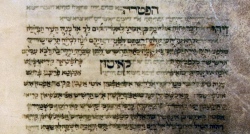Florence, University Library, Ms Ebr. 3574 (Modona 12)
Origins
Crete (?), 15th c. (in the opinion of Modona, 88)
Provenance
In late 16th the codex seems to have belonged to Moses b. Shebbatai Hakohen Protouli of Canea (Hania, Crete) and then to Abraham b. Judah Balazza (d. 1650), the writer of a note mentioning an epidemic in Candia (Iraklio, Crete) in March 1592, and to the latter’s son Judah.
Contents
Prayer book for the festivals of Pentecost, New Year and Day of Atonement. 249 v -252 r, Book of Jonah in Greek.
Codicology
Parchment, 283 fols, 27.5 x 21 cm.
Palaeography
Square and semi-cursive Hebrew characters, pointed.
Bibliography
de Lange, Nicholas, A Jewish Greek version of the book of Jonah, Bulletin of Judaeo-Greek Studies, 16, Summer, 1995, 29-31.
Hesseling, D.-C., Le livre de Jonas, Byzantinische Zeitschrift, 1901, 208-217.
Modona, Leonello, Catalogo dei codici ebraici della biblioteca della R. Università di Bologna, Florence, 1888.
